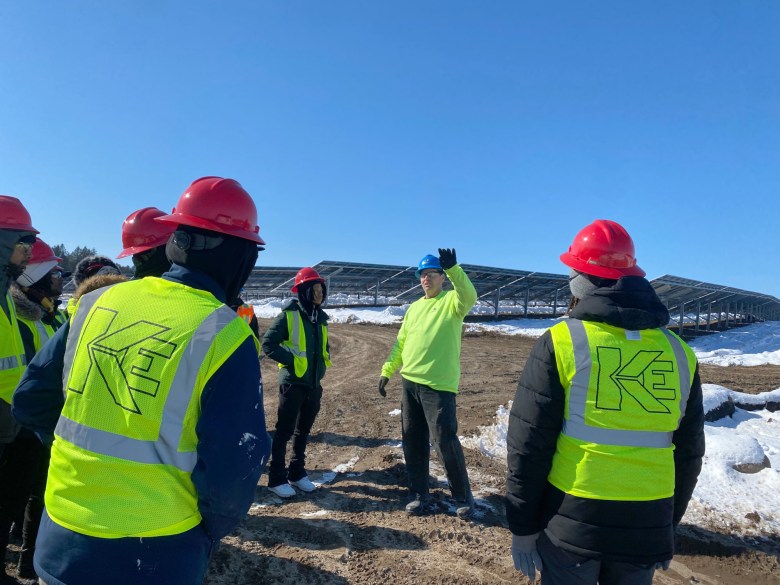Increased activity in the solar energy space has generated the need for more trained and skilled workers. At the same time, disinvested populations are often shut out of these jobs.
For people who have spent time in prison, it’s even harder to catch a break.
The Renewing Sovereignty Project — or RSP, based in Chicago — seeks to address both circumstances, not just with job training, but also financial and social support designed to lend substance to the phrase “returning citizen.”
RSP draws seed funding from community solar developer Cultivate Power, which has pledged six years of financial support. Trainees are recruited through the Chicago Coalition for Intercommunalism, a collection of more than 70 grassroots organizations across the city working to achieve social change.
Instruction is provided by training partner 548 Foundation, while job placement is achieved through multiple hiring partners, including Knobelsdorff Energy.
RSP also provides referrals for possible sealing or expungement of past convictions, which can ease the transition process for eligible participants, according to Jacqueline Williams, Regional and Prison Program Director for Zealous, a social support organization that functions as a primary administrator for RSP.
Opportunities created by the Illinois Climate and Equitable Jobs Act, or CEJA, earned high praise from Williams, who is determined to ensure those investments yield results.
“The worst thing that we can think of is that all of this money gets poured into these training programs … and then none of [the participants] actually get jobs in the solar field,” Williams said.

Reducing recidivism
While recidivism rates are dropping around the country thanks in large part to the 2008 Second Chance Act, job training and reentry programs for justice impacted people have had mixed success.
According to the findings from a 2023 report from the National Institute of Justice, or NIJ, intensive, individual-focused programs are more effective in reducing recidivism.
For instance, Mt. Tamalpais College, housed within San Quentin Prison, allows enrolled inmates to earn an associate’s degree transferable to four-year institutions. Each student receives an individual education plan — including intensive tutoring. Only 5% of its graduates ever return to prison.
Likewise, on average 96% of those who complete the JUMPSTART Prison Ministry program, currently active in South Carolina, Georgia, North Carolina, and Ohio will never return to prison. This peer-led program works with individuals while they are incarcerated as well as after their release.
Specifically, the NIJ report emphasizes that a holistic approach to reentry employment training programs — like RSP — is essential to maximize the chances of a justice-impacted individual actually getting hired.
Williams said that often includes addressing fundamental needs like housing, food, child care and transportation.
“Anything that you can think of that would prevent someone from being successful in a really intensive 13-week program, we’re going to assess that barrier and we’re going to provide it. And those needs do change throughout the course of 13 weeks. And so we’ll be responsive pretty much immediately to those changing needs,” Williams said.
RSP’s results track with the findings of the NIJ report, and justify its intensive wraparound services. According to the RSP website. the first cohort of 12, which completed the program in 2023, achieved a 100% placement rate in solar and related industries. The current cohort of 18 graduates is on a pace to achieve similar levels of success, Williams said.
“There are a lot of workforce training programs. We didn’t need to add another training program. What we needed to add was the intensive wraparound services and the barrier mitigation and the alumni support that really allows people to go from truly one completely different aspect of their life to through this training and into a long-term career in green energy,” Williams said.

Doing well by doing good
Cultivate Power has committed $1.75 million over six years to support RSP, while also furthering their own mission of developing a more inclusive solar workforce in Illinois. Over the past two years, Cultivate Power has funded more than $500,000 in support of the current cohort of 18 graduates and the previous cohort of 12 graduates.
Noah Hyte, managing director and co-founder of Cultivate Power, said the partnership with RSP is “one of the bigger commitments we’ve made” toward community initiatives.
“We’re in a situation broadly as an industry in Illinois where there’s simply not enough labor and construction companies to meet the demand associated with CEJA’s goals,” he said. “The state’s doing an excellent job of providing tens of millions of dollars of funding to workforce development programs to create workforce development hubs. And so we didn’t see a problem writ large with the scaling of workforce development. [Instead] we saw an opportunity for this specific group of people, and this specific profile that needed additional support, that needed a more thoughtful and wraparound approach to ensure that they would be as successful as possible in this endeavor.”
Along with funding, Hyte and fellow managing director and co-founder Brian Matthay lend their business know-how in advising the administration of RSP, while leaving the work of providing training and support services to 548 Foundation and Zealous, Hyte said.
Inclusive vetting
Programs like JUMPSTART, Mt. Tamalpais College — and RSP — operate on the principle that justice-impacted individuals are not throw-away beings. This recognition extends to the intensive selection and preparation process for prospective cohort members that takes place before they are assigned to a training program.
The vetting process performed by organizations within the Chicago Coalition for Intercommunalism focuses on developing candidates so that they are prepared to draw the most benefit from the training.
“We get each one of our individuals as a referral,” Williams said. “They have to be a part of a community organization. And the reason for that is it really provides another layer of support and another layer of safety net for individuals, most of whom are system impacted. The vast majority of our individuals are involved with the criminal justice system in some way or have been to foster care.
“They go through the whole year of the program where they work on conflict resolution and personal readiness and violence prevention and all those things before they enter the workforce space. Each organization has that same model. So by the time they get to us, they are more ready,” Williams said.
RSP also imposes a strict attendance requirement — which reflects expectations that trainees will face on the job. However, commitment to the wraparound approach often makes the difference between a candidate dropping out — or finishing the program and obtaining a good job.
“If somebody hasn’t shown up three days in a row, we’re not just going to kick them out of the program. We’re going to send somebody to your house, probably somebody from your coalition partner and see if you’re okay. We’re trying to find out the whys and not be punitive and recreate the same systems that we are trying to overturn. We really bring people that support right to their door.
“You can have the best intentions in the world, but if the lights are out at home and the refrigerator is not running and you’re not able to feed the kids, you’re not going to be able to complete that program,” Williams said.

Getting job-ready
Candidates referred to 548 Foundation for workforce training must meet two specific requirements: the ability to lift 40 pounds and read at an eighth-grade level. Beyond that, actual workforce training involves more than specific job-related task instruction, said 548 Foundation founder and CEO AJ Patton.
“They’re intentional about picking folks from the toughest situations, not just, oh, kid just graduated, doesn’t know what he wants to do in his life. No, they’re talking, ‘You just came home from prison. You’re in a tough situation. Here’s your chance. We’re going to put our arms around you.’
“We spend the first two weeks of class talking about professional development and human development, conflict resolution, how to be a professional, how you present yourself and how to communicate on a job site. Those things matter way more before I ever teach you how to install a solar system,” Patton said.
This preliminary instruction reflects a recognition of the lived experience of training cohort members.
“We know in the streets how you address those things. There’s a very clear protocol. You call me out my name, this is what you get. But on the job site it’s different. We’re professionals now. There’s a kind of recalibration of how we engage one another and how we engage our contemporaries and colleagues,” Patton said.
That being said, frequently, it’s the “hard timers” who perform the best during training and in the job market, Patton said.
“People want to work. If you’re willing to show up on time and commit to the effort and the cost, then there’s a marketplace for you… That particular subset of the community has been the group that’s probably been the most focused in the classroom. They’ve been the most attentive. They know what this opportunity means. They’ve been working hard. And they are almost overwhelmed at graduation when there’s a bidding war for their efforts… I’ve had guys that spent 17 years in prison come to my program, and at the end of the program, they had three job offers,” Patton said.
Ongoing wraparound support
The individualized, specialized guidance and support each participant receives continues for a full year beyond formal graduation. Drawn from what the program calls an alumni fund, such assistance can be anything from a down payment for a reliable car to get back and forth to work, referrals and resources for child care or providing funds for required tools and clothing, Williams said.
“Anything can really knock you for a loop. I mean, somebody hit a coyote the other day and blew out their radiator, and we just immediately got the radiator fixed so they wouldn’t miss a day of work. It’s those sorts of [situations] that can just totally derail a person that we try to just mitigate by providing access to that fund as well as mentorship,” Williams said.
Sometimes support takes the form of providing a sounding board, Williams said.
“There’s a lot of just phone calls around, like,’ This is really hard, it’s really hard to be away from my kids and I don’t know if I want to do this.’ And then we think through different options. ‘Would you rather do rooftop solar closer [to home]? Is this just a bad day? Or, is this something that you really want to consider changing?’ So that’s sort of like, guidance and mentorship. We’re pretty much on call all the time. Just making sure that we are there and available for people,” Williams said.
For Williams, Hyte, Patton and their various community and industry partners, RSP is not so much social service as an investment in society, and beyond that, working toward achieving a true just transition away from a carbon-fuel powered economy.
“So really our mission is to try to make these careers viable and sustainable for people through all that additional support …The success is not graduating the program. That’s a milestone. That’s a really great important milestone.
“But it doesn’t mean anything if people aren’t actually changing the trajectory of their lives and their family’s lives. And if we aren’t actually changing the face of what solar looks like in Illinois and across the country. It’s so important for us to be clear about what success is. And success is a long-term career in green energy,” Williams said.
Illinois program’s ‘wraparound’ approach helps formerly incarcerated people land solar industry jobs is an article from Energy News Network, a nonprofit news service covering the clean energy transition. If you would like to support us please make a donation.




